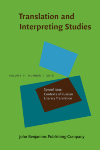
Translation and Interpreting Studies
Scope & Guideline
Exploring the Art and Science of Translation and Interpreting.
Introduction
Aims and Scopes
- Cultural and Linguistic Adaptation:
Explores how translations and interpretations adapt to various cultural contexts, including the nuances of language and the specific needs of target audiences. - Cognitive and Psychological Aspects:
Investigates cognitive processes involved in interpreting and translating, including the effects of language structures on cognitive load and fluency. - Interdisciplinary Approaches:
Promotes interdisciplinary research that connects translation studies with fields such as sociology, political science, and cultural studies. - Social Justice and Activism:
Examines the role of translation and interpreting in social justice movements, particularly in relation to marginalized communities and identity politics. - Technological Integration:
Analyzes the impact of technology on translation and interpreting practices, including machine translation and computer-assisted interpreting tools. - Historical and Contextual Studies:
Focuses on the historical context of translation and interpreting practices, exploring how they have evolved and influenced cultural exchanges over time. - Professional Practice and Ethics:
Addresses the professional standards, ethics, and challenges faced by translators and interpreters in various settings.
Trending and Emerging
- Crisis Translation and Cultural Mediation:
Emerging focus on the role of translation in crisis situations, such as during the COVID-19 pandemic, highlighting the importance of cultural mediation in facilitating communication. - Queer Theory and LGBTQ+ Representation:
A significant increase in research addressing LGBTQ+ themes in translation, including activism and representation, reflecting broader societal movements towards inclusivity. - Fan Translation and Community Engagement:
Growing interest in fan translation as a form of cultural engagement, exploring how communities interact with and reinterpret media through translation. - Cognitive Load in Interpreting:
Increased research into the cognitive challenges faced by interpreters, particularly in high-pressure environments, emphasizing the need for understanding mental processes in interpreting. - Technological Advances and Machine Translation:
Heightened exploration of the implications of machine translation and technology on professional practices, including effectiveness and ethical considerations. - Political Discourse and Translation:
Emerging themes focusing on the relationship between translation and political discourse, particularly in the context of global events and media representation.
Declining or Waning
- Traditional Literary Translation:
There is a noticeable decline in research specifically focused on traditional literary translation, as the journal shifts towards more contemporary and applied aspects of translation. - Purely Linguistic Analyses:
Studies focusing solely on linguistic features of translation without considering cultural or cognitive implications have become less frequent, indicating a move towards a more integrated approach. - Static Theoretical Models:
The journal has moved away from static theoretical models of translation, favoring dynamic, contextual, and interdisciplinary frameworks that reflect current complexities in the field. - Historical Case Studies:
Interest in historical case studies of translation practices has waned, with a greater emphasis now placed on contemporary issues and practices. - Generalized Approaches to Interpreting:
Research that treats interpreting as a homogeneous practice without acknowledging specific contexts or cultural nuances is becoming less prevalent.
Similar Journals
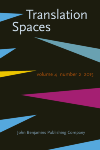
Translation Spaces
Charting New Territories in Translation and LinguisticsTranslation Spaces is a premier academic journal dedicated to the interdisciplinary study of translation and its implications across various fields, including communication, linguistics, and literature. Published by John Benjamins Publishing Company, this journal is based in the Netherlands and boasts an impressive impact factor, reflecting its significance in the scholarly landscape, particularly within Q1 quartiles for Communication, Linguistics and Language, and Literature and Literary Theory as of 2023. Recognized for its commitment to advancing knowledge, Translation Spaces provides an essential platform for researchers, educators, and practitioners to explore innovative theoretical perspectives and empirical findings. With a comprehensive scope that spans from 2016 to 2024, the journal is indexed in Scopus, securing high ranks in both Arts and Humanities and Social Sciences, offering a 99th percentile rank in Literature and Literary Theory and maintaining a strong presence in Linguistics and Language. The absence of open access options ensures that the quality and integrity of published research are upheld, making it a valuable resource for the academic community engaged in translation studies.

Cadernos de Traducao
Connecting researchers through rigorous peer-reviewed studies.Cadernos de Tradução, published by the Universidade Federal de Santa Catarina, is an esteemed open-access journal dedicated to fostering scholarship in the fields of Language, Linguistics, and Literature. Since its inception in 1996, this journal has emerged as a vital platform for research, particularly known for its rigorous peer-review process and commitment to academic excellence. With a Q2 ranking in Linguistics and Language and a Q1 ranking in Literature and Literary Theory as of 2023, it stands out in the global academic landscape, holding significant positions in Scopus rankings across various categories. Researchers, professionals, and students will find a wealth of interdisciplinary studies that contribute to current discussions and advancements in translation theory and practice. The journal's open-access model enhances visibility, ensuring that groundbreaking research is accessible to a wide audience, thus promoting dialogue and collaboration within the international academic community.

Estudios de Traduccion
Championing critical thought in translation methodologies.Estudios de Traduccion is a distinguished academic journal published by UNIV COMPLUTENSE MADRID, SERVICIO PUBLICACIONES, dedicated to advancing the field of translation studies. Since its establishment, the journal has embraced an Open Access model, providing researchers, professionals, and students with free and unrestricted access to high-quality scholarly articles since 2011. With the ISSN 2174-047X and E-ISSN 2254-1756, it serves as a vital resource for those interested in innovative methodologies, theoretical advancements, and practical applications within translation. By championing interdisciplinary research and fostering dialogue among scholars from diverse backgrounds, Estudios de Traduccion plays a crucial role in shaping the understanding of translation as a dynamic and evolving discipline. As a reputable platform, it invites contributions that stimulate critical thought and inspire future research in this essential area of communication.
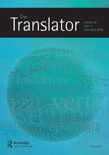
Translator
Empowering Researchers with Cutting-Edge Translation ResearchTranslator is a leading journal in the fields of Communication and Linguistics, dedicated to exploring the complex dynamics of translation through critical analysis and scholarly discourse. Published by Routledge Journals, Taylor & Francis Ltd from the United Kingdom, this journal boasts a significant impact within its academic community, holding a prestigious Q1 ranking in Linguistics and Language and a Q2 ranking in Communication as of 2023. With a strong focus on interdisciplinary studies, it aims to foster an understanding of translation as both a linguistic and culturally significant practice. Researchers and practitioners alike can engage with cutting-edge research and extensive discourse, making it a valuable resource for advancing knowledge in this vital field. The journal spans a remarkable convergence of insights from 1995 to 2024, reflecting its long-standing commitment to academic excellence and innovation. Access to its resources is facilitated through various platforms, ensuring that findings are readily available to the broader academic community.

Germanoslavica-Zeitschrift fur Germano-Slawische Studien
Fostering Dialogue Between German and Slavic TraditionsGermanoslavica-Zeitschrift für Germano-Slawische Studien, published by the esteemed SLOVANSKY USTAV AKAD CESKE REPUBLIKY, serves as a pivotal platform for scholarly discourse in the fields of linguistics and literary studies. Since its inception in 2002, this journal has dedicated itself to exploring the intricate relationships between German and Slavic languages and literatures, fostering a greater understanding of this culturally rich intersection. With its publication indexed in Scopus and categorized in the Q4 quartile for Linguistics and Language as well as Literature and Literary Theory, it provides valuable insights at the junction of these disciplines. Although it currently does not have open access options, the journal's commitment to quality research ensures it remains a respected resource for researchers, professionals, and students alike. The journal’s dedication to advancing knowledge makes it an essential reference point for those investigating the complexities of Germano-Slavic interactions.
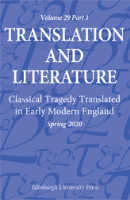
Translation and Literature
Illuminating the Art of Translation in LiteratureTranslation and Literature is a leading academic journal published by Edinburgh University Press, focusing on the intricate relationship between language and literature within the realms of translation studies. With an ISSN of 0968-1361 and an E-ISSN of 1750-0214, this journal provides a crucial platform for scholars and practitioners to explore and disseminate research that addresses both the theoretical and practical aspects of translation. Since its inception in 1996, Translation and Literature has established itself as an essential resource, particularly noted for its contributions to the fields of linguistics and literary theory, as indicated by its Q4 ranking in both categories in 2023. The journal's articles are designed to foster dialogue across disciplines, encouraging innovative thinking and collaboration among researchers, professionals, and students alike. Access to this valuable resource is currently available through subscription, ensuring high-quality scholarship reaches a diverse audience dedicated to advancing the understanding of translation's role in literature.
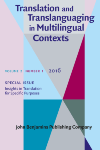
Translation and Translanguaging in Multilingual Contexts
Exploring the Nexus of Translation and MultilingualismTranslation and Translanguaging in Multilingual Contexts, published by John Benjamins Publishing Co, is an esteemed academic journal that delves into the intricate relationships between translation practices and translanguaging in diverse linguistic settings. With its ISSN 2352-1805 and E-ISSN 2352-1813, this journal provides a platform for innovative research from 2019 to 2024, focusing on areas that intersect education, linguistics, and literary theory. Notably, it holds prestigious rankings, reflecting its impact and quality; it is classified in Q2 in Education, and Q1 in both Linguistics and Language, and Literature and Literary Theory for 2023. With Scopus rankings that place it in the top deciles of multiple categories, it serves as a vital resource for scholars aiming to explore multilingual communication's challenges and opportunities. Although it operates on a traditional access model, the journal remains a critical reference point for the exchange of ideas that shapes current research in these dynamic fields.
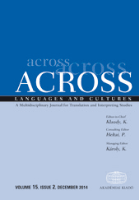
Across Languages and Cultures
Unraveling Language's Role in Cultural DiscourseAcross Languages and Cultures is a leading journal in the field of Linguistics and Language, published by AKADEMIAI KIADO ZRT in Hungary. With its ISSN 1585-1923 and E-ISSN 1588-2519, the journal has established itself as a prominent platform for advancing research and discussion in the dynamics of language across diverse cultural contexts. Its impressive Q1 category ranking indicates its significant influence, with a Scopus rank of #227 in Language and Linguistics, showcasing its robust academic impact (79th percentile). This journal, converging from 2007 to 2024, aims to foster interdisciplinary dialogue and promote innovative research methodologies in multilingual studies. Though not an open-access journal, Across Languages and Cultures provides invaluable insights for researchers, professionals, and students eager to explore the intricacies of language use and its sociocultural implications. Located at Budafoki Ut 187-189-A-3, H-1117 Budapest, Hungary, it continues to serve as an essential resource for those passionate about the linguistic sciences.

Bible Translator
Illuminating the Impact of Translations on Faith and CultureThe Bible Translator is a distinguished journal dedicated to the scholarly exploration and analysis of biblical translations and their impact across cultures and traditions. Published by SAGE Publications Ltd, this journal seeks to bridge the gap between theology, linguistics, and intercultural communication, providing an essential platform for researchers, translators, and educators alike. With an ISSN of 2051-6770 and an E-ISSN of 2051-6789, it ensures broad accessibility to its readership. Although it currently does not operate under an Open Access model, the journal's rigorous peer-review process and commitment to high-quality research make it a vital resource for professionals and students in the fields of religious studies and translation theory. Contributing to the ongoing discourse around scriptural texts, The Bible Translator remains pivotal in fostering understanding and appreciation of the intricacies involved in translating sacred writings, thereby reinforcing its importance in both academic and applied contexts.
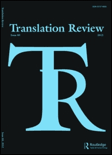
TRANSLATION REVIEW
Exploring New Horizons in Translation Studies.TRANSLATION REVIEW is an esteemed academic journal dedicated to advancing the field of translation studies, encompassing critical analysis and theoretical explorations that inform contemporary practices in linguistics and literature. Published by Routledge Journals, Taylor & Francis Ltd, this journal has earned a respectable reputation within the scholarly community, evident from its current categorization in the Q3 quartile in Linguistics and Language and Q2 in Literature and Literary Theory. With issues spanning from 1978 to the present, TRANSLATION REVIEW reflects a rich legacy of scholarly discourse while also engaging with emerging trends in translation theory and pedagogy. The journal's Scopus rankings place it within the top 30% percentile of Arts and Humanities research, providing a significant platform for researchers and professionals to disseminate their findings. As a non-open access journal based in the United Kingdom, it welcomes contributions that offer new insights and foster dialogue around translation's multifaceted impact in a global context. Scholars, practitioners, and advanced students will find this journal an invaluable resource for both theoretical frameworks and practical applications in translation studies.